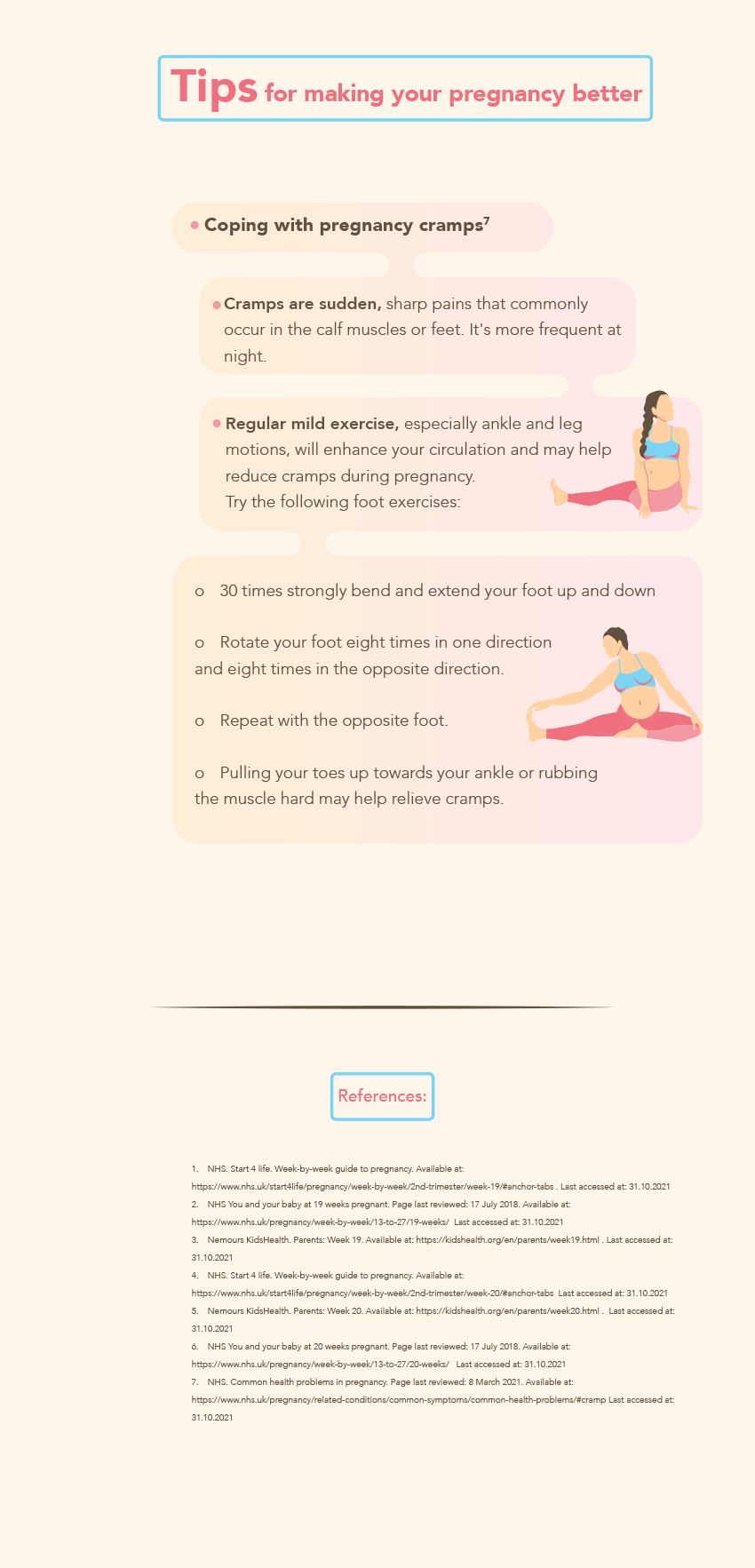Pregnancy Weeks 19-20
You may be feeling less active and tired because of a lack of sleep or carrying extra weight. Tempting though it is to stay on the couch, get out there and get some exercise, but don't overdo it.


Your Pregnancy Week 19
You've almost reached the half-way point.1
What is happening with your baby at pregnancy week 19?2,3
- Your baby is gaining weight but still lacks fat, so they would appear wrinkled if you could see them now.
- For the rest of the pregnancy, the baby will gain weight and "fill out" in the weeks leading up to birth.
How big is your baby?
Your baby is about the size of a large tomato and weight of two salmon fillets.1
Your Body
- When you're around 17 or 18 weeks pregnant, you might feel your baby move for the first time. Most first-time mothers notice the first movements between 18 and 20 weeks pregnant.2
- At first, you may notice a fluttering or bubbling sensation, or a very slight shifting movement.2
- Later on, the movements are unmistakable, and you can even see the baby kicking around. Often, you can tell whether a hand or a foot causes a bump.2
- There is no set number of baby movements you should experience. The most important thing is to become familiar with your baby's typical movement pattern.2
- Once you felt your baby's movements, you should continue to feel them until they are born.2
- As your bump grows bigger week by week, some of the things you used to take for granted will become more difficult. By week 40, you'll be congratulating yourself for being able to put on your socks!1
- Staying active is beneficial for both you and your baby, but some workouts, such as running, may cause discomfort.1
- This is because the hormone relaxin loosens your ligaments, leaving your back, knees, and ankles without the support they need.
- When you exercise, you should be able to talk (this is known as the 'talk test')
Your Pregnancy Week 20
You've made it to the halfway point of your pregnancy!
What is happening with your baby when you are 20 weeks pregnant?4,5
- A white, greasy film called vernix has formed on your baby's skin. This is to protect their sensitive skin from drying out in the amniotic fluid. This smooth surface also aids in passaging babies through the birth canal.
- Every day, your baby will get more active.
- Your baby may suck their thumb besides kicking, punching, and turning around - this develops their sucking reflex, which they'll need to suck milk after they're born.
- It's possible that you'll notice bubbling or fluttering in your pregnant belly, which is your baby moving about.
How big is your baby?
- Your baby is the size of a banana and the weight of approximately three juicy apples.4
Your Body
- You might notice a dark line running down the center of your stomach. As your tummy expands to suit your growing bump, this is typical skin pigmentation.6
- Because normal hair loss slows, your hair may appear thicker and shinier.6
- Severe pains in your calves can wake you in the middle of the night. It's most likely a cramp, which is very frequent throughout pregnancy.
- Muscle spasms produce it, and it might feel like someone is stabbing you in the leg for up to 10 minutes.4
- Muscle spasms produce it, and it might feel like someone is stabbing you in the leg for up to 10 minutes.4
Tips for Tips for making your pregnancy better
- Coping with pregnancy cramps7
- Cramps are sudden, sharp pains that commonly occur in the calf muscles or feet. It's more frequent at night.
- Regular mild exercise, especially ankle and leg motions, will enhance your circulation and may help reduce cramps during pregnancy. Try the following foot exercises:
- 30 times strongly bend and extend your foot up and down
- Rotate your foot eight times in one direction and eight times in the opposite direction.
- Repeat with the opposite foot.
- Pulling your toes up towards your ankle or rubbing the muscle hard may help relieve cramps.
References:
- NHS. Start 4 life. Week-by-week guide to pregnancy. Available at: https://www.nhs.uk/start4life/pregnancy/week-by-week/2nd-trimester/week-19/#anchor-tabs . Last accessed at: 31.10.2021
- NHS You and your baby at 19 weeks pregnant. Page last reviewed: 17 July 2018. Available at: https://www.nhs.uk/pregnancy/week-by-week/13-to-27/19-weeks/ Last accessed at: 31.10.2021
- Nemours KidsHealth. Parents: Week 19. Available at: https://kidshealth.org/en/parents/week19.html . Last accessed at: 31.10.2021
- NHS. Start 4 life. Week-by-week guide to pregnancy. Available at: https://www.nhs.uk/start4life/pregnancy/week-by-week/2nd-trimester/week-20/#anchor-tabs Last accessed at: 31.10.2021
- Nemours KidsHealth. Parents: Week 20. Available at: https://kidshealth.org/en/parents/week20.html . Last accessed at: 31.10.2021
- NHS You and your baby at 20 weeks pregnant. Page last reviewed: 17 July 2018. Available at: https://www.nhs.uk/pregnancy/week-by-week/13-to-27/20-weeks/ Last accessed at: 31.10.2021
- NHS. Common health problems in pregnancy. Page last reviewed: 8 March 2021. Available at: https://www.nhs.uk/pregnancy/related-conditions/common-symptoms/common-health-problems/#cramp Last accessed at: 31.10.2021